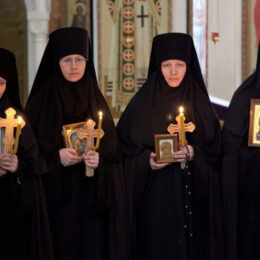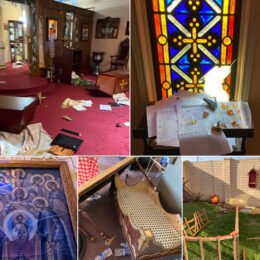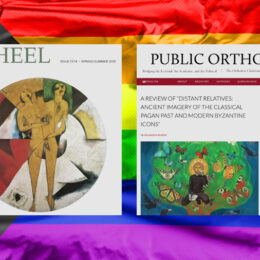Christianity Today Rob Moll September 2, 2005
“How can you worship a homeless Man on Sunday and ignore one on Monday?” said the sign outside St. Edward’s Cathedral in Philadelphia. Inside, a group of 40 homeless families were joined by students from Eastern University to protest the eviction of women and their children from the abandoned Kensington neighborhood church. In 1996, the story was all over the news as a community activist group and a crowd of Eastern students fought the eviction by living in the church, sleeping on pews, and worshiping each Sunday. Shane Claiborne and other students left Eastern’s campus in St. Davids, drove the 20 miles into Philly, and unpacked their things in the nave.
. . . more




Interesting, but can it last? I ask because if you notice these kids are coming from liberal intuitions and are motivated by liberal ideology/worldview (when I saw that they met at Durham/Duke Divinity – with “academics” – I almost laughed). The desert Fathers went to the desert not to “reach out” but to reach in, or rather reach out from within to Christ.
My wife spent a couple of months at JPUSA in Chicago years ago, one of the last “Jesus Freak” communities. Her sister lived there for 3 years, and met her husband there. This is a protestant community that “reaches out” – but that is not the cause/sustaining philosophy of their community. They are much more inward looking, as is traditional monasticism.
Christopher
There has been a developing trend among Evangelicals to search for more traditional, historic understandings of Christianity over the past few years.
Many are starting to look beyond the feelings and decision toward a Christian faith of substance. You can see the trend in some of the newer books, Bible studies, and articles starting to appear.
JBL and Christopher –
This trend is accelerating. I was just at my parents (Church of God) over the Western Easter weekend. My dad was finishing up a book on ‘Christian Formation’ put out by one of his denomination’s pastors.
The pretext of the book was that Evangelicals had focused on reaching the ‘unchurched’ and on saying the ‘sinner’s prayer’ so much with the unchurched, that they had forgotten to actually transform their own parishioners in the image and likeness of God.
The word the dear pastor was struggling to find was ‘Theosis.’ Strangely enough, however, he was able to write a whole book on essentially that topic without using that word.
And that is the deal with all of this. The Protestants have figured out that their way isn’t working. They know that something is missing, so they are busy running around trying to invent it or discover it. All the time, ‘it’ is sitting right under their nose, but because it might involve things that are ‘Catholic looking,’ they feel compelled to make it up as they go along.
I dealt with the worship aspect of this in a post at the Central Florida Orthodox Christian Forum.
The kids running around doing these things are one step away from a cult. Without the guidance of spiritual fathers and a grounding in the tradition of the Holy Catholic and Apostolic Church, they could all easily lose their way and become a modern equivelent of the ‘Shakers.’
However, just like the Evangelical Orthodox Church eventually ‘re-engineered’ itself back into the Orthodox fold, I think these groups and the current trends offer us Orthodox a lot of opportunity. Time to simply step up and let the world know that we are here!
Glen, having by the Grace of God come out of a cult very similar to that which you describe, I can testify to the power of God to make Himself known in any circumstance. The crux of the matter will be whether the evangelicals really want to know God in greater fullness or if they would rather follow their own minds.
Just letting them know we are here will not be enough, we too have to actually be practicing the path of Theosis: prayer, fasting, repentence, and almsgiving, attendence on the Sacraments, especially Divine Liturgy. And of course, we will have to be hospitable.
We sometimes forget the power of our services to move people. There were two folks who were Christmated into the Church in my parish on Holy Saturday who’s first direct contact with the visible Church was at a funeral. Obviously, their friend had done his part to prepare them, but our funeral service is a massive testimony to the Grace, love, and healing present with Jesus Christ in the Church. It is cathartic in the true and complete sense of the word.
Have you ever talked to your Dad about John 6: 47-55, the passage where Jesus says unless you eat of my body and drink of my blood, you have no life in you? I’ve never heard a Protestant comment on that passage and it has never come up in my conversations with any.
There is so much Scriptural foundation for what we do. The Antiochian parish in Oklahoma City was working with so many Protestant inquirers, they produced an annotated Litrugy with Scripture references to each part as a teaching tool.
Genuine Christian asceticism forms the foundation for a real and lasting critique of life in the modern world. I’m not necessarily talking about monastic asceticism, althought that has a part, but rather about lay asceticism in the world. The big areas to deal with are food, work, entertainment, friendships, family and sexuality. To practice the unseen warfare to which we are called, requires not just denial of sin, but the practice of virture.
How many of us can sucessfully reject all of the chocolat and other goodies around during the Advent fast? Do we work to live simply or do we simply work, striving for more authority, recognition and money? TV and movies, to we choose or do we just consume all of the filth that comes our way? Do we gossip about our friends? Is our family really important to us in the sense that Paul describes, i.e., the willingness to sacrifice all for them? Do we stand for chastity and modesty and attempt to inclucate those virtures in our children as well as practice them ourselves?
This is a short list and one at which I have failed frequently, but it is IMO what basic Christian asceticism is all about. If we rely on the grace of God and support each other, all of us will have more success.
Note 5. Michael writes:
This is very true. When I was younger, unmarried, and battling lust like all young men do, I learned through practical experience that channeling sexual desire leads to greater creativity. It was a lesson learned about human nature quite by accident but the centering I experienced taught me that the commandments that prohibit certain behaviors extend way beyond the “thou shalt not” dimension we first hear. Only later, when I became Orthodox and started learning about ascestical practices, Orthodox anthropology, etc. did I find the vocabulary to properly conceive and articulate these experiences.
Now when guys approach me about mastering their bodies rather than their bodies mastering them, I tell them it begins with prayer and fasting. If they fast like the Apostle Paul says (“Offer your bodies as a living sacrifice…”) and pray (“… and be transformed by the renewing of your minds…”), this demon (and it is) of lust can be overcome. It’s not easy to do in our culture which is so sex-saturated and geared to keep the batteries on full charge and the senses on high alert all the time, but it can be done. The fasting begins simply, ie: following the basic rule of no meat on Wednesdays and Fridays, and no eating for eating’s sake. The prayer means laying the struggle at the feet of God. There is no shame in temptation and great virtue in bringing any temptation into the light of Christ.
Meanwhile, discipline has to be cultivated in other areas of life. Again, with young men I ask them if they make their beds in the morning. Most don’t of course (I didn’t either), but this simple act, first done when you wake up, establishes a pattern of discipline early in the morning that can have great benefit during the entire day. It sounds simple, but it works.
Ascesticism really works on these practical levels. You begin with what you can do, and it develops from there on its own.
Michael, what Protestant denomination have you been talking to? In the liturgical churches it’s not that uncommon.